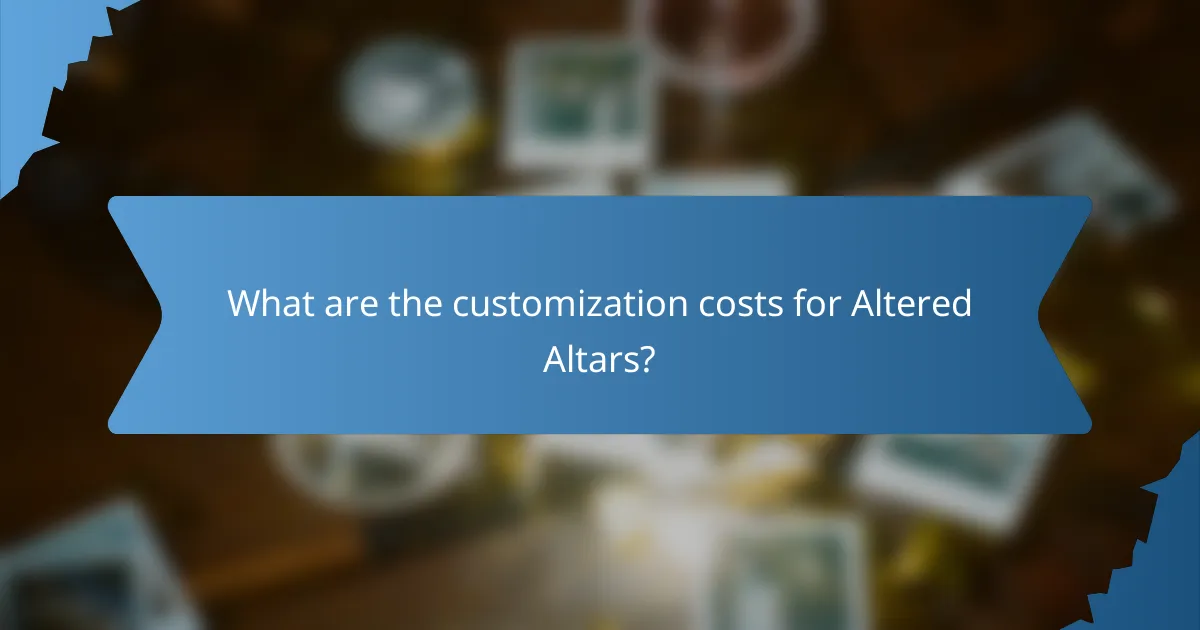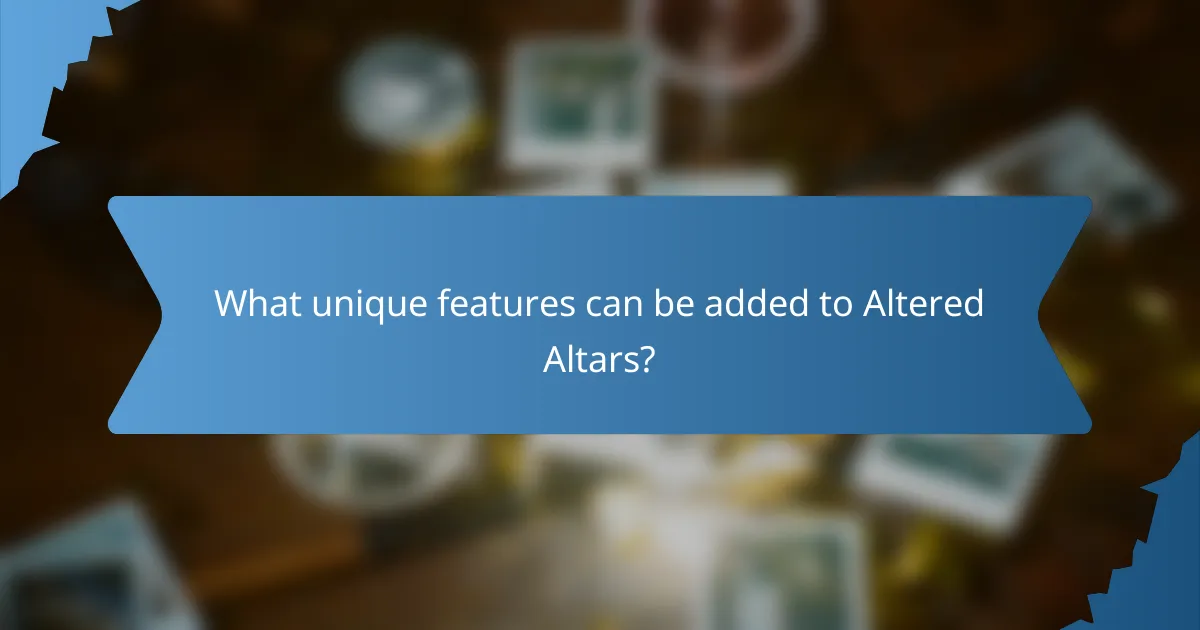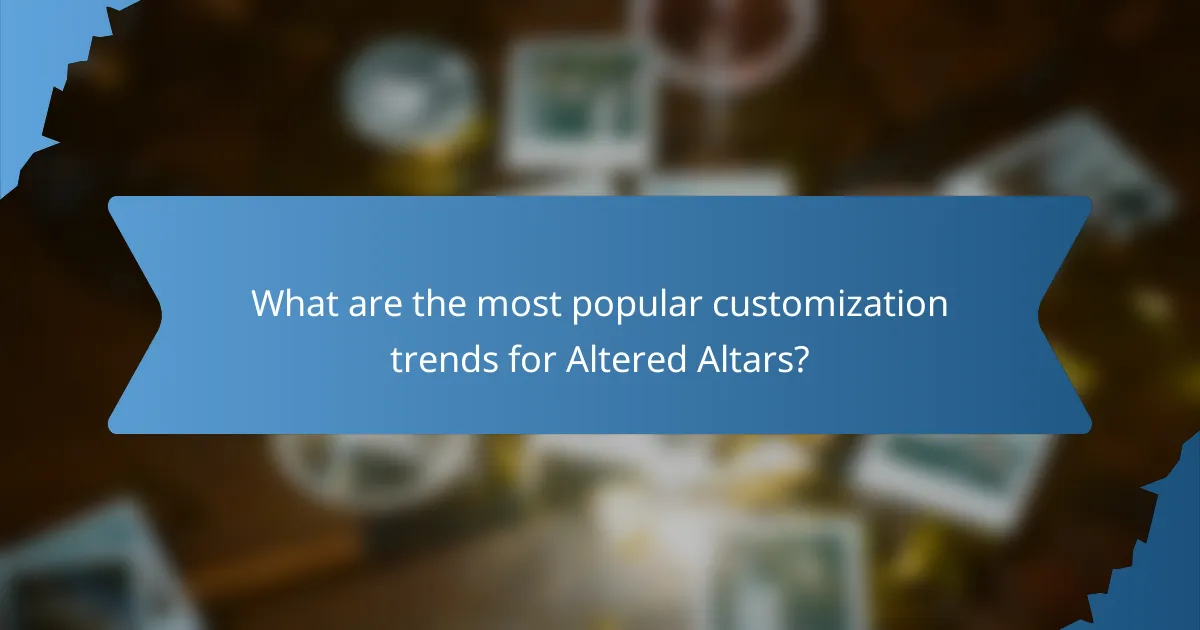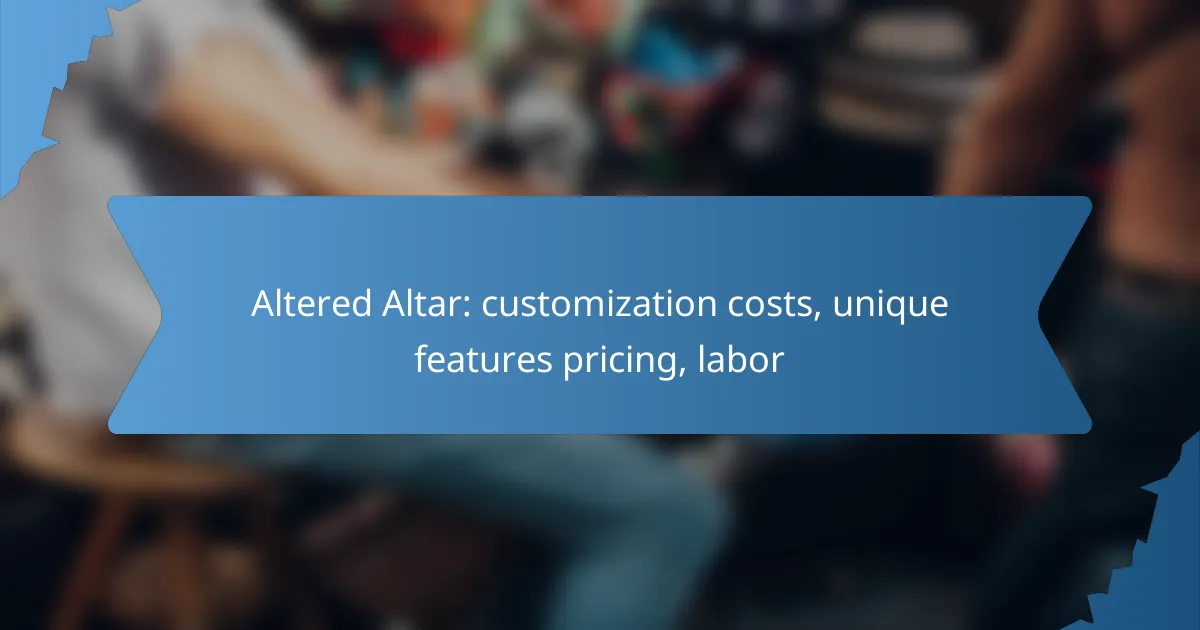When considering an Altered Altar, customization costs can vary widely based on the selected features and enhancements, typically ranging from several hundred to a few thousand dollars. Unique features, such as different materials and design elements, not only enhance the altar’s functionality but also its aesthetic appeal. Additionally, labor costs play a significant role in the overall pricing, as skilled craftsmanship is essential for achieving the desired customization, influenced by design complexity and regional labor rates.

What are the customization costs for Altered Altars?
Customization costs for Altered Altars can vary significantly based on the base features and additional enhancements selected. Typically, these costs range from several hundred to a few thousand dollars, depending on the complexity and materials involved.
Base customization costs
The base customization costs for Altered Altars generally start around $500 and can go up to $2,000. This price often includes standard materials and basic design options, such as size and shape adjustments. Consider the specific features you want, as more intricate designs will increase the base cost.
Additional feature costs
Additional features, such as unique finishes, personalized engravings, or integrated technology, can add anywhere from $100 to over $1,000 to your total. For example, custom artwork or high-end materials like marble can significantly elevate the price. Always assess the value these features bring to your altar to ensure they align with your budget.
Labor costs in major US cities
Labor costs for customizing Altered Altars can differ widely across major US cities. In cities like New York or San Francisco, skilled labor may range from $75 to $150 per hour, while in smaller cities, rates might be lower, around $50 to $100 per hour. It’s advisable to obtain multiple quotes from local artisans to find the best value for your customization project.

What unique features can be added to Altered Altars?
Altered Altars can be customized with various unique features that enhance their functionality and aesthetic appeal. These features typically include different materials, design elements, and technology integrations, each contributing to the altar’s overall purpose and user experience.
Material options
When selecting materials for Altered Altars, options range from traditional woods to modern composites. Common choices include oak, cherry, and bamboo for a classic look, while metal finishes or glass can provide a contemporary touch. The cost of materials can vary significantly, often starting from a few hundred USD for basic options to several thousand for premium selections.
Consider durability and maintenance when choosing materials. For instance, wood may require regular polishing, while metal might need protective coatings to prevent rust. Always weigh the aesthetic appeal against practical upkeep.
Design elements
Design elements for Altered Altars can include intricate carvings, personalized engravings, and decorative accents. These features not only enhance visual appeal but can also reflect personal or cultural significance. Custom designs often add to the cost, with simple engravings starting at around 50 USD and elaborate carvings reaching into the low thousands.
When planning design elements, think about how they align with the altar’s intended use. For example, a more ornate design might suit ceremonial purposes, while a minimalist approach could be better for everyday use.
Technology integrations
Integrating technology into Altered Altars can elevate their functionality, with options such as lighting systems, sound equipment, or smart controls. These integrations can enhance the user experience, allowing for customizable settings and interactive features. Basic technology setups may start at a few hundred USD, while advanced systems can exceed several thousand.
Before adding technology, assess the complexity and potential maintenance needs. Ensure that any tech features align with the altar’s purpose and that users are comfortable operating them. Avoid overcomplicating the design, as simplicity often enhances usability.

How does labor impact the pricing of Altered Altars?
Labor significantly affects the pricing of Altered Altars, as skilled craftsmanship is essential for customization. The complexity of the design and the region’s labor rates can lead to varying costs, making it crucial to understand these factors when budgeting for your altar.
Labor rates by region
Labor rates for altar customization can differ widely based on geographic location. In North America, hourly rates may range from $50 to $150, while in Europe, rates can vary from €40 to €120. In contrast, regions with lower living costs, such as parts of Eastern Europe, might offer rates as low as BGN 30 to BGN 80 per hour.
When selecting a craftsman, consider not only the rates but also their expertise and reputation. A higher rate may reflect superior skills and quality, which can save you money in the long run by reducing errors and rework.
Time estimates for customization
The time required for altar customization can vary based on the complexity of the design and the materials used. Simple alterations might take a few hours, while intricate designs could require several days or even weeks. On average, expect customization to take anywhere from 10 to 40 hours.
To manage your project effectively, discuss timelines upfront with your craftsman. Establishing clear expectations can help avoid delays and ensure that your altar is completed within your desired timeframe.

What factors influence the total cost of Altered Altars?
The total cost of Altered Altars is influenced by several key factors, including material quality, design complexity, and location-based pricing. Understanding these elements can help you budget effectively and make informed decisions about customization options.
Material quality
The quality of materials used in an Altered Altar significantly impacts the overall cost. High-quality woods, metals, and finishes tend to be more expensive but offer greater durability and aesthetic appeal. For example, solid hardwoods can cost several hundred dollars more than particle board alternatives.
When selecting materials, consider the long-term benefits of investing in higher quality. While the initial expense may be higher, it can result in lower maintenance costs and a longer lifespan for the altar.
Design complexity
Design complexity plays a crucial role in determining the cost of an Altered Altar. Intricate designs with detailed carvings or custom features require more labor and time, which can increase the price significantly. Simple designs may start in the low hundreds, while complex customizations can reach into the thousands.
To manage costs, consider simplifying your design or opting for pre-existing templates that can still meet your aesthetic needs without the high price tag associated with custom work.
Location-based pricing
Location-based pricing can vary widely depending on regional labor costs and material availability. Urban areas often have higher prices due to increased demand and overhead costs, while rural areas may offer more competitive rates. For instance, an altar in a city like New York may cost 20-30% more than one in a smaller town.
When budgeting, research local artisans and suppliers to get a sense of the price range in your area. This can help you find the best deals and avoid unexpected expenses related to shipping or sourcing materials from distant locations.

What are the most popular customization trends for Altered Altars?
The most popular customization trends for Altered Altars focus on eco-friendly materials, smart features, and personalized designs. These trends reflect a growing desire for sustainability, technology integration, and individual expression in altar creation.
Eco-friendly materials
Using eco-friendly materials is a significant trend in Altered Altars, appealing to those who prioritize sustainability. Common options include reclaimed wood, bamboo, and recycled metals, which reduce environmental impact while providing unique aesthetics.
When selecting materials, consider the sourcing and lifecycle of each component. For instance, reclaimed wood may offer character and history, while bamboo is known for its rapid growth and renewability. Costs can vary, but expect to pay a premium for high-quality, sustainable options.
Smart altar features
Smart altar features are becoming increasingly popular, integrating technology to enhance spiritual practices. Options include LED lighting, sound systems, and even apps that provide guided meditations or rituals.
When incorporating smart features, consider the ease of use and compatibility with existing devices. Prices for these enhancements can range from modest to significant, depending on the complexity and brand of the technology. Ensure that the features align with your spiritual goals to maximize their effectiveness.
Personalized designs
Personalized designs allow individuals to create an altar that reflects their unique beliefs and aesthetics. This can involve custom carvings, specific color schemes, or the inclusion of personal symbols and artifacts.
To achieve a truly personalized altar, collaborate with artisans or designers who specialize in bespoke creations. Costs can vary widely based on the intricacy of the design and materials used, often starting in the low hundreds and reaching into the thousands for elaborate pieces. Prioritize elements that resonate with your spiritual journey to create a meaningful space.
